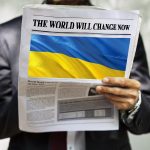ERIC MIZZONI
In late 2016, on the occasion of his 85th birthday, former Dutch Minister of Economic Affairs and D66 party prominent Jan Terlouw held an emotional speech on television calling for trust. Trust from the people towards politics, as well as trust from politicians towards citizens. The widespread lack of confidence from “the people” in politics seems to be one of the most prominent issues of our time. It is hard to say whether we are more busy complaining about politicians on the one hand, or worrying about the very same perceived climate of diffidence towards politics on the other. There seems to be an overwhelming consensus about the fact that faith in politics is at an all-time low in history. But does the claim pass the test of reality?
According to Mr. Terlouw, confidence in political leaders was much more commonplace during the reconstruction after World War II. Of course, people never agreed with Government decisions; but there was no diffidence towards the political class. Not only that, but people would also have more faith in each other. People would be able to enter each other’s homes right through the front door. All of this may sound incredible, if not outright unrealistic for most people younger than 85; which is to say, most people in general. But fact is that the perception of safety and reciprocal trust among citizens was greater in the 1950s than it is today.
But what about people’s faith in Government? According to the pollsters, faith in Government and political institutions was indeed greater in those days as compared to the last few decades in most European countries. Nevertheless, we must keep in mind that history does not start in the 1950s. Peoples distrust towards politics has been a prominent sentiment all around the world not merely for centuries, but for thousands of years. Ancient Rome was a prime example. Roman citizens used to celebrate the death of corrupt Emperors, only to find out they would loathe the following Emperor even more than the previous one. This may sound familiar, since similar sentiments manifest themselves every few years in many modern democracies.
Liberalism can be most accurately defined as the effort from the individual to liberate him- or herself from Government influence. The French Revolution, from which modern liberalism draws its roots, originated precisely out of the resentment on behalf of the people towards the ruling class. In some way, the contrast between the restlessness of the citizens and the complacency of the political class also laid at the foundations of D66. Should we then be nostalgic for the post-War parentheses of perceived blind trust – which was really exceptional – or should we embrace skepticism as a value and only place our faith in those who are able to prove themselves worthy of our confidence?
There is a profound difference between mistrusting politicians and mistrusting a political system as a whole. What we did learn from the War is that freedom is fragile, and ought to be defended. And the most effective system for doing that is democracy. In order to preserve our freedom, we must call out those political movements which show authoritarian tendencies; improve our debates when dealing with charming rhetoric about equality over liberty; repeal the radicals who call for revolution and anarchy. It is by now undisputable: democracy is indeed the worst political system except for all others. To doubt democracy is dangerous, to doubt political leaders is healthy.
Author Profile
-
Co-Founder of European Liberals for Reform
Chairperson of ELfR Working Group Health
ALDE Individual Members Steering Committee Member (2022-2023)
Social Media & Digital Marketing Expert, Blogger
Favorite Topics: Health, Society, LGBTQI
Latest entries
 Elections13/04/2022Presidential elections in France 2022
Elections13/04/2022Presidential elections in France 2022 Human Rights22/03/2022ELfR to support Manifesto for inclusive gender-based violence law
Human Rights22/03/2022ELfR to support Manifesto for inclusive gender-based violence law EU07/03/2022Five possible scenarios for the outcome of the Ukraine war
EU07/03/2022Five possible scenarios for the outcome of the Ukraine war Ukraine06/03/2022ELfR starts petition to nominate Volodymyr Zelenski for Sakharov Prize
Ukraine06/03/2022ELfR starts petition to nominate Volodymyr Zelenski for Sakharov Prize
Post Disclaimer
The opinions expressed by the author of this post do not necessarily represent the opinions and policies of ELfR.


Well said. As a Scot married to a German I now regard the “uk government” as an enemy which I will call out and defy. We in Scotland voted to remain in the uk in 2014 because of English politicians’ threat that if we left uk we would lose our place in EU. Then we voted 62% Remain in EU in the brexit referendum of 2016 with all Scottish constituencies voting remain and my wife did not get a vote because she was not a uk citizen. It is undemocratic to take us out of the EU and I refuse to co-operate or comply with brexit. If uk rules diverge from EU rules, our household will continue to follow EU rules. If the rules diverge we can only now remain loyal to one union, uk or EU and we are with EU.